PHILIPPINES
Heroism from the Eyes of the Young Generation
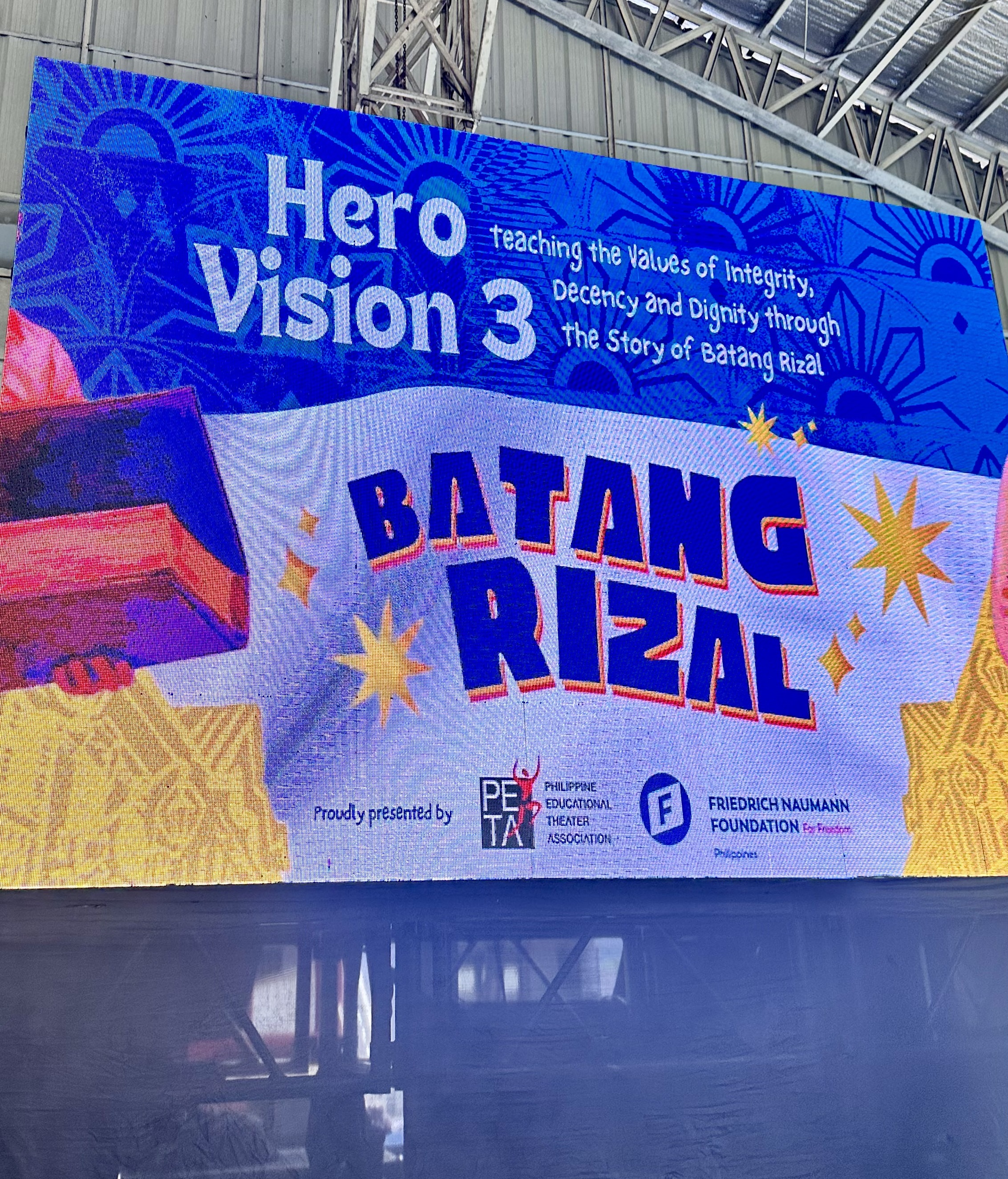
The PETA musical “Batang Rizal” features the story of a young boy named Pepito and young Jose "Pepe" Rizal and their quest on finding out the truth about the Philippines heroes.
© FNFWhat really makes a hero?
To help the young generation build ongoing relevant conversations and meaningful reflections on how they can become modern-day heroes despite cultural and psychosocial differences, the Philippine Education Theater Association (PETA) in partnership with the Friedrich Naumann Foundation Philippines (FNF) invited more than 4000 students from 17 public and private elementary and high schools and colleges from Pasig City, Tarlac City, and Infanta in Quezon Province to attend the three-leg Hero Vision 3 campaign. This activity which is now on its third year, is held from March 16 to April 8 and featured the streaming of the video version of the PETA musical “Batang Rizal” which is the story of a young boy named Pepito and young Jose "Pepe" Rizal and their quest on finding out the truth about the Philippine heroes.
This year’s edition was the first in-person after its online versions the past two years. It aimed at helping the young people acquire a critical definition and understanding of what heroism is, discern the contexts and qualities of being a hero, and reflect on how they can be modern-day heroes as well.
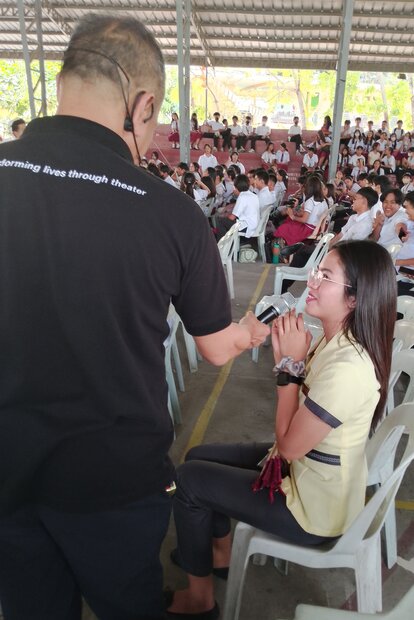
A representative from PETA gathering insights of the participants on the concept of heroism.
© FNFDrawing out inspirations from our national hero Jose Rizal as the young Pepe in PETA’s play “Batang Rizal”, the students defined a hero in their creative and narrative reflections as “nagbuwis ng buhay para sa bayan” [someone who gave up one’s life for the country’s sake] and “pinahahalagahan ang kalayaan ng bayan” [someone who values the nation’s independence]. Some viewed a hero as “nagbibigay ng inspirasyon sa ating lahat” [a source of inspiration to everyone], “gumagawa ng pagbabago para sa bayan” (initiates changes for the nation), “nagsisikap para sa bansa” [perseveres for the motherland], and “hindi kinakailangang magbuwis ng buhay” [someone who need not die for the country].
A number of students have perceived a hero as “matulungin” [helpful], “may lakas ng loob na ipaglaban ang kanyang paninindigan para sa sarili at kapwa” [has the courage to stand for one’s principles and beliefs for self and others], “may pananagutan” [responsible and accountable], and “mabuting tao” [good person]. One student emphasized “lahat tayo ay puwedeng maging bayani ano mang oras” [we can all be heroes at any time]. All we need is respect, empathy, and other positive lifelong values. These perspectives attest to the definition of a hero as an exemplary being who embodies the qualities, values, ideals, and aspirations of a person as an individual and a community as a collective.
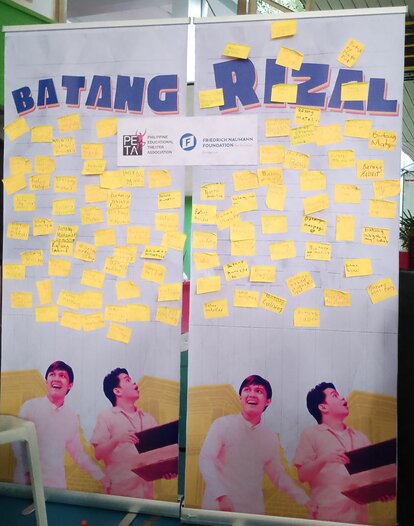
PETA asked the participants to write the qualities a hero should possess.
© PETAWhen asked by PETA on how the students can be a hero in their own little way at home, in school, and in the community, “pagtulong sa mga gawaing-bahay” [helping out in household chores], “pagsunod at paggalang sa mga nakatatanda sa atin” [following and respecting our elders], “pag-aaral nang mabuti” [studying well], “pagsama sa paglilinis sa barangay” [joining barangay cleanups], “paggamit sa karapatang bumoto [exercising our right of suffrage], and “pagiging mabuting tao” [being a good person] were some of their responses. The educators likewise shared their insights on being a hero, like the continued practice of courtesy and respect by saying “po” and “opo” and the proper singing of Lupang Hinirang, our national anthem.
The concept of heroism is definitely one of the solutions to learn from our past, redefine the present, and the future of our nation. The participating students hold on to that hope as they share their opinions and recommendations to empower individuals to make a difference in their communities. Some of the students even push for the return of history as a subject in the Philippine basic education curriculum to enable today’s generation to learn from the lessons of our country’s past.
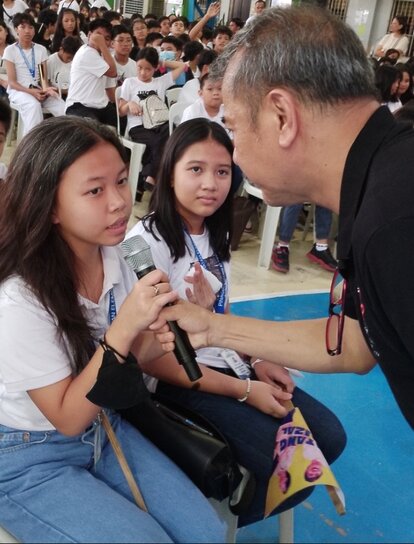
A representative from PETA inquires on the qualities of a true hero
© PETAIndeed, the activity gave birth to a collection of ideals which will serve as an instrument to change our nation. One of the students stated, “A true hero does acts of kindness with integrity and not merely for the sake of being called so, and expects nothing in return”. “A hero is not a one-size-fits-all and comes in any shape, size, age, gender, educational attainment, or social status,” another student added. These ideals will ignite a fire in the hearts of our youths and will help them push forward.
The Filipino youths have the time, skills, and energy to make changes happen in the future. After all, they account for the 28 percent of the Philippine population thus, making them a force to reckon with.
This article is written by Rb Andres of the Philippine Education Theater Association.
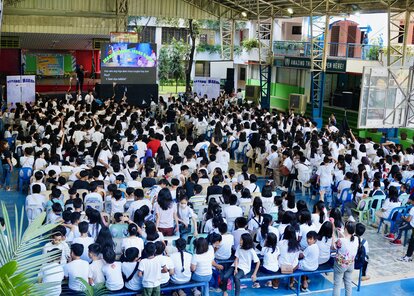
More than 4000 students from 17 public and private elementary and high schools and colleges from Pasig City, Tarlac City, and Infanta in Quezon Province attend the three-leg Hero Vision 3 campaign.
© FNF